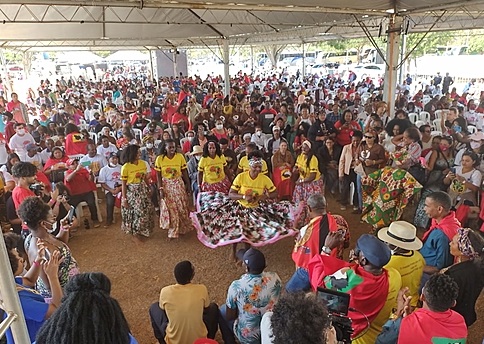
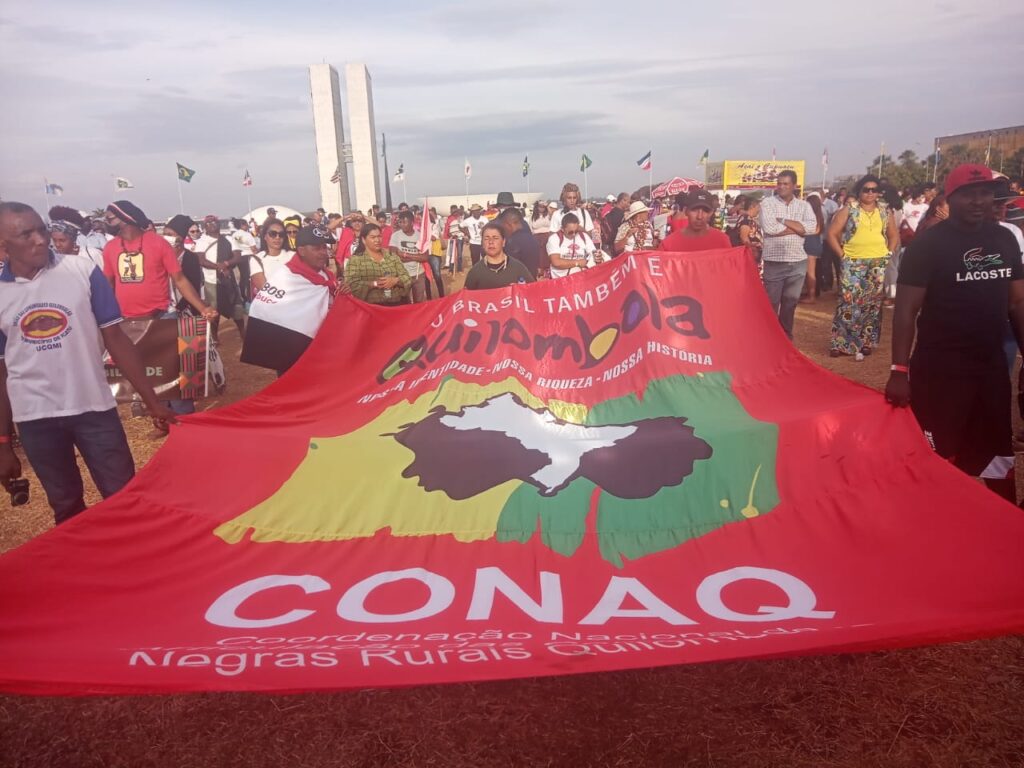
The National Commission for the Coordination of Black Rural Quilombola Communities (Coordenação Nacional de Articulação das Comunidades Negras Rurais Quilombolas: CONAQ) called on the quilombola and non-quilombola population to join the AQUILOMBAR act, which took place on 10 August in Brasilia, Federal District. The Aquilombar was organized jointly by partners and state quilombo organizations, uniting members of quilombola communities from 22 states and the Federal District. CESE provided support for 384 quilombolas to attend, coming from 7 states: Mato Grosso, Bahia, Tocantins, Goiás, Espírito Santo, Minas Gerais and Rio de Janeiro. The aim of the act was to mobilize the quilombola population to denounce the dismantling of public policies, violence and violations perpetrated inside – and outside – their territories, and to emphasize the importance of the quilombola population for the country’s political, economic and socio-environmental debates. In addition to a march and public act, demonstrators also held a general plenary with quilombolas from around the country and participated in a public hearing in Congress to debate issues such as education, land regulation, social security and work, racism, heath and the quilombola census. The programme came to a close in the evening with a showing of the film “Do quilombo à favela – alimento para resistência negra” (From the quilombo to the favela – food for black resistance).
For Sandra Pereira Braga (Quilombo Mesquita/Goiás) CONAQ’s Executive Coordinator, the Aquilombar represented a historical landmark for the protagonism of quilombola communities and the quilombola movement: “Meeting this fellowship, speaking for ourselves, having an impact at the Senate, at the Chamber, in the presence of so many women and young people, from a range of communities from various states in Brazil, thrills me. There are certainly more acts to come. Thank God, CESE and all the partners who supported this moment for strengthening, exchange and sharing.” It is the second time that a quilombola mobilization of this size has taken place in Brasilia. The last was in 1995, three centuries after the death of Zumbi dos Palmares. Six months later, CONAQ was founded.
Marcella Gomez, CESE Projects and Training Advisor, was present at the act and noted: “With an intense programme and a range of debates to discuss the priority agendas of the quilombola communities of Brazil, the Aquilombar will enter history as one more agenda of struggle, mobilization and political advocacy led by quilombola people. In a manner to stir hearts, the political act that occupied Brasilia also served to communicate to the whole of society the power, resistance and importance of these communities for the country, either for food security, for the guarantee of preserved traditional territories, for cultural productions, for education and so forth. Without a doubt, CESE’s presence at the Aquilombar only reaffirms our commitment to and lessons learnt from this brave group.”
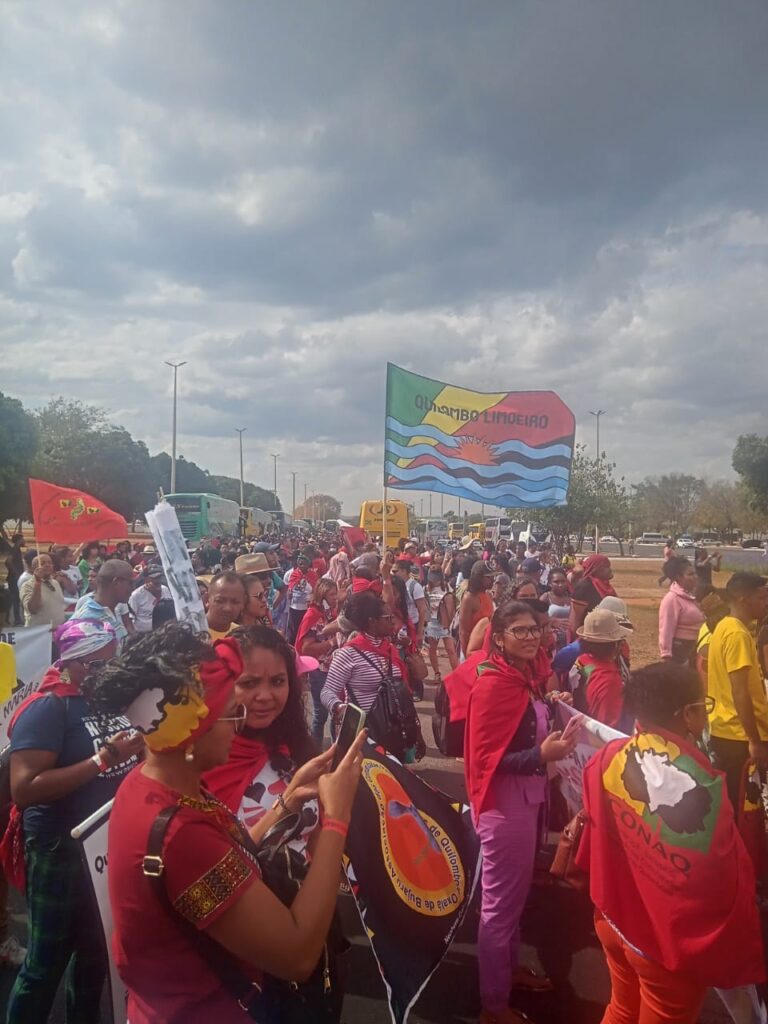
THE QUILOMBOLA STRUGGLE
In her article “Os quilombos que o Brasil insiste em ignorer” (The quilombos that Brazil insists on ignoring) Selma Dealdina, CONAQ’s Administrative Secretary, explains that the word “aquilombar” is more than a mere verbal reference to a hiding place established during the regime of enslavement. “Quilombo is a symbol of resistance against oppressors and a place of welcome,” noted Denildo Rodrigues, known as Biko, a member of CONAQ’s national coordination team: “[It means] to defend access to the land, biodiversity, our country’s democracy and to fight against the dismantling of public policies, to fight so that our people are no longer murdered.” A survey conducted by the Brazilian Institute of Geography and Statistics (Instituto Brasileiro de Geografia e Estatística: IBGE) (based on the last census in 2010) estimates that there are 5,972 quilombola communities in 1,672 municipalities in Brazil. Of the almost six thousand quilombola locations in the country, only 404 territories have been officially recognized and less than 200 are entirely demarcated and entitled. In the meantime, more than 1,700 cases await regulation at the Institute of Colonization and Agrarian Reform (Instituto Nacional de Colonização e Reforma Agrária: INCRA).
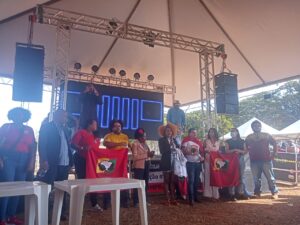
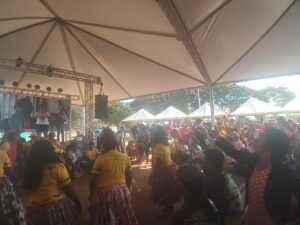
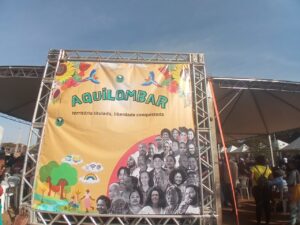

According to the Pastoral Land Commission’s (Comissão Pastoral da Terra: CPT) report on Conflict in the Countryside, in 2021 there was an increase of 418 territories affected by land-based violence. Of these, 28% are in indigenous territories and 23% on quilombola lands. “We – the quilombola, indigenous, traditional communities – are on the frontier that prevents agri-water-mining businesses taking over the Brazilian countryside,” said Denildo Rodrigues. The CPT also noted that violence in the form of humiliation affects 25% of male and 40% of female quilombolas. Between 2011 and 2021, 21% of violations suffered by women involved rape. “We are the invisible guardians of the forest. When we look at the Amazon, we don’t see ourselves. But 68% of the Amazon biome is inhabited by black people. So the Amazon is black,” Biko declared. “And quilombolas have paid a very high price for protecting this biodiversity, including in the bodies and blood of black people.”
With information from @conaquilombos and the Brasil de Fato newpaper.
Photos: Marcella Gomez / CESE and Maryellen Crisóstomo / CONAQ

